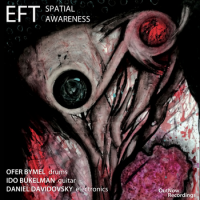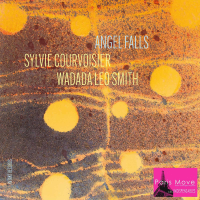Home » Jazz Articles » Interview » Bill Dixon: An In-depth Look into the Accomplishments, ...
Bill Dixon: An In-depth Look into the Accomplishments, Philosophies, and Convictions of the Man
How do you feel about the almost obligatory clapping in the United States after a solo?
It interferes. It can break your line of thought so easily, because that is when you are your most fragile. Most musicians have a tendency to go where an opening for reception to what they are playing, has been indicated by the applause .
When I talk with musicians, they say it is nice to know the audience is with them, but for me, it mars the entrance of the next performer and disrupts the vibes generated thus far.
Not only that, it can ruin a piece. We are talking about creative music, but I don't find that happening too much in certain areas and circumstances of the music.
Encores are also an unnecessary thing to my mind.
I do not, as a rule, do encores. When I have finished playing, I have indeed finished playing. I have nothing left; there has been no reserve. At Victoriaville, the applause was long and enthusiastic so we did do encores, one with the three of us, Tony, Cecil and myself and the last one for Cecil.
I find it unrealistic for an audience to expect more after an artist has drained himself in a performance.
It's an old show business routine. When I stop I have nothing else left to play.
On In Italy II, you are incisive on piano while Stephen Haynes and Arthur Brooks hold down the trumpet chairs on this complex session. Although the two trumpeters free you for the piano improvisations, are you comfortable in relinquishing the brass role to others within your band? Are you more critical of their role?
I took them because they were good players and both had been students of mine, and I was giving them an opportunity to play. The initial criticism voiced about that from some people was that Bill Dixon was only coming with his students. There is no 'only' when it comes to my usage of people who have had studies with me. When musicians are able to do things, I use them in my work. It wasn't that I was more critical of them, it was they had a chance to do this thing publicly. David Murray was in the audience and heard what I was doing. With me he has always been a gentleman. He introduced himself to me before the performance in Florence. When I finished that, I went to Paris to do a thing with Oliver Johnson and Kent Carter—Steve Lacy's then rhythm section—and I let people such as Earl Cross and Arthur Doyle sit in. My young son observed that I did not play as I had in Verona and the rest of the tour. I told him Steve and Arthur had been there, so there was no musicological reason for me to play in a certain way. I did not have to compete with them. A musician has to understand his role as that relates and changes within the formation of groups.
By the way, I love the recording where your son interrupts you and then emulates your sound with his voice.
Oh yes, that is "I See Your Fancy Footwork," the three-part composition for which he gave me the title. Isn't that something? That was a prime example of taking advantage of the moment, and exploiting it compositionally. The moment, the content and contours of that moment, dictated that.
On Berlin Abbozzi, your tonality has a more pronounced echo effect than previously. What did you use to achieve that unusual sound?
I have been using delay and reverberation since the middle 1960s. I use them to make what is almost inaudible to the ear, audible. I do not use them to play loudly but to make the higher harmonics heard. They did it very well there. Engineers have a lot of problems with that. They have a tendency, when the needle goes into the red, to fool with it. It ruins it, you see. I like to do multiple layers. If it is done right, I can play three lines simultaneously. There is no trick to it. If I place the delay properly and long enough, I can play something against that, and something against that. That is my interest at this particular point. Reverberation takes the dryness out of the tone. I use three mikes: one for delay, one for reverberation, and a clear mike.
Then you are doing a real-time manipulation of your sound.
That's right. I use no sampling or anything like that. In the Berlin Abbozzi piece, it all worked perfectly. I think people who sample are cheating. It is like people who do collages. Use all of your own stuff.
LOOKING AHEAD
In Dixonia, you list a wide array of music that has not been released, and some of the lineups are tantalizing. Do you have any plans for making these treasures available? Have attempts to release any of it in the past been met with problems?
Had I the financial resources, and were there a significant number of people interested, I would make a considerable amount of it available, but the musicians would have to be paid. I would never do something if the musicians weren't paid. Odyssey is done the way it is because I did not have money to pay musicians. It wasn't intended to be a solo thing, but I spent so much money legally with the Cadence affair, I just could not do it. But it is my intention for Archive Editions, which is my own record thing, to release works in 100-copy lots just for collectors. By the way, Ben Young and I worked on Dixonia for four or five years before it came out.
We talked earlier on things in the music world that were disturbing to you. If you were given the opportunity, what would you change?
One of the most remarkable places I ever worked in was called URDLA in Villeurbanne France, near Lyon. Those things on the wall downstairs are lithographs. They invited me to do them there. I spent two months there and learned how to do lithographs. The place was large enough to be a performance space and a place for the visual arts. I would like to take one of these old factory buildings here in this town, fix it up as they did in URDLA, and arrange for musicians and painters to come and do work. I'd make it a place where I could work and invite those musicians of whom I had an interest to do work for a small public.
Here in Vermont?
I would do it right here, because it is pure here. I am not interested in people turning the corner and saying "I'll drop in here for a minute." This place is an oasis in the desert if someone is willing to do that. I did a lot of work at the college like that. When I got to Bennington College in 1968, there wasn't a Black pair of shoes on the campus. The Black Music Division after its formation had all kinds of people to do everything, lecturers to cover everything. I formed that department so that I could get some work done and not have to answer to anyone. I did what I thought was necessary to make this a true art. If I had money, I would like to get an old building, have music performances, do lithographs, have shows of paintings, and do those things that I'm interested in doing.
It is never going to be a mass media art form.
Why do we keep making believe it even should be? Why can't it be what it is and just be done well?
Yes, but that is why our music is labeled a music of elitists.
Well, maybe it is an elitist music. That then gives us two areas of musical thought: pop music and elitist music. Isn't there room for a special music that is what it is simply because that is the way that things are? There is always going to be different forms of music. I do not think we should put down rap music and things like that. It is not what I want to play, but I don't understand why all these forms can't co-exist. I had this idea of putting money away, and hunting for musicians who have had to scuffle and then reward them in some kind of way personally. I have not given up on that. Thelonious Monk would not be eligible to enter the Thelonious Monk competition today. Do you see the irony in these things? No one would recognize a Charlie Parker if he surfaced now. We have gotten so slick; we have taken every creative bone out of things formerly considered special and parceled it into an acceptable, antiseptic form. Why? That is not necessarily the way for an art to continue. The people who dole out grants do not understand the mistake they are making, because the next Charlie Parker is out there somewhere. He is not in one of these schools. He is not getting any of these grants. This music desperately needs to be subsidized so that the people who are trying to do something and have no access can have access to something. I was on one of the National Endowment Panels some years ago and it was an eye-opener to actually witness the selection process in operation.
And you were not in a position to change it?
No individual can change anything. Change can only be instituted by the dynamic of a group effort. We have powerful figures in this music that have seen fit to move away to make some of the large money that is accessible in popular music. In actuality, they have abandoned the more creative areas of the music. For a variety of reasons, a considerable number of which are quite legitimate, it is advanced that there is less money to be made in this music. And as a consequence of that kind of thinking, musicians have been suckered into believing that everybody except jazz musicians should be supported in their work. If more musicians are performing in Europe than here, it is because someone here doesn't feel the music is significant. No one person can change this. I think much of the criticism directed at Wynton Marsalis about there not being more White musicians used in the orchestra is unfair, and it is obvious he does not need any support or endorsement from me. I watched the birthday broadcast of Kurt Masur the other night on public television and I didn't see a single Black musician in that orchestra, the New York Philharmonic. There were women there, but I did not see one Black musician. However, if I mention that, I am playing the race card.
Musicians have challenged this practice in the past.
When it was challenged years ago by some black musicians, the immediate results consisted of, at that time, the hiring of three women double bassists. For whatever reason you just don't see Black players in those orchestras in any numbers that make them visible. Jazz music though, serves as the democratic institution in the arts, while formal concert music is not at all questioned about its sometimes-perceived methods of exclusion. And it must be by tacit agreement that it isn't even discussed. John Zorn can discuss, relating to music and other things, what might be of interest or troubling to him, and his views are given an airing without question. But if Bill Dixon attempts to raise issues or be critical of things, in music and other areas that are of interest to him, all of a sudden there is a problem. Does that make any kind of sense?
You alluded to being systematically excluded by the media.
A few years ago a Downbeat writer, who has written favorably about my work in the past, became infuriated with me when I questioned the philosophical logic of something that he had written. He just about told me that references to my work were now going to be non-existent. He adopted the attitude, and he was not the first one, of how dare you, as a Black musician, question anything that I have written. He had written something in a book called Jazz Among the Discourses, and I read it and raised objections from my point of view as a musician. These intellectuals seem to think that everyone of them knows more about the music and the hows and whys of its being done than the musicians who create it. He became very upset with me simply because I disagreed with him. Some years ago, when an article on my work was to be published in a magazine and when I asked if it was going to be a cover story, I was told that it wasn't, because I do most of my work in Europe. This writer also accused me of being ungrateful, and they do not review my work any longer. Dixonia was not reviewed by them, and neither was Berlin Abbozzi or Papyrus. Someone determines in this music, who has done the music and who should be revealed to the music public as having done any music. It is a selection process that I feel is patently unfair. It does not present the history of the music, and there is absolutely nothing we, as musicians who do music that isn't popular, can do about it.
Surely, you can do something?
I decided many years ago when it became definitively clear that that was how it was, that I would simply work. And that is what I've done systematically. I am not a young man, and I do not have time or patience for this foolishness. I was quite optimistic in the 1960s. I thought musicians would see the futility of sitting around and waiting for someone to hire them. Musicians I respected have permitted themselves to make some incredibly bad compromises. The problem with the idea of compromise right from the very beginning is, if you know you are right and everyone knows you are right, how can you compromise? You can only compromise when you are not too sure that you're completely right. But after you've compromised your principles for a period of time, it can easily become a way of life.
You have problems with reporters and their approach, don't you?
I was asked once in an interview what I felt of a certain person's work. I responded that I had never read where he asked that person what he thought about my work. If that person's work was in the vanguard of my thoughts, I would be doing that person's work, not my work. My work takes the priority. The words were turned around, and the interviewer accused me of being difficult. I am not difficult. If an artist is interviewed, do you interview him because you really want to know what that person thinks as it relates to his art? Do you trust him? Do you believe him?
Why do you continue, then, fighting uphill?
I don't know. But whatever I do, I attempt to do it fully. I try, and don't always succeed, to be thorough. There are musicians who do not know their worth, and if they knew it at one time, it has eluded them. I know my worth. You try not to dwell in the past.
You suggested that the media has used some musicians.
Even though Miles Davis, as an artist and innovator of the first magnitude, enjoyed considerable success in the early sixties—financially and otherwise—when the new music was beginning to be heard and discussed, he and his views were used by members of the critical establishment to buttress their hostility and negativity regarding that music as a logical development of what had preceded it. This was accomplished by Leonard Feather, a senior critical writer and journalist, playing recordings of Ornette, Cecil, or Eric Dolphy, for Davis to identify and rate, relating to musical merit, for Feather's "Blindfold Test." The predictable result, since it was an open secret that Miles absolutely detested the music, was an attack and vicious condemnation of the music, by Miles, thereby reinforcing Feather's own publicly known negative assessment of it.
I have the June 18, 1964 issue of Downbeat, when their practice was to print blank spaces in lieu of the profanity spoken by artists. Miles is quoted as saying about Cecil Taylor's Live at the Café Montmartre: "Take it off! That's some sad _____, man." In the same article, he said of Eric Dolphy's Far Cry: "That's got to be Eric Dolphy—nobody else could sound that bad! ... I think he's ridiculous. He's a sad _____."
But that was a case of the musician being musically baited, and once he unfortunately denounced the music, Feather's own feeling about that area of the music became validated.
That made me resent Miles.
If you favored this music, that was what you were supposed to do. It would naturally set you against him. This was a classic example of the divide and conquer syndrome. Miles was always a beautiful player even with those lesser groups that he had. One beautiful phrase from him and the entire band could be forgiven its inadequacies. But for all his genius, he was quite negatively vocal about the emerging new music of the sixties. My first concert in Verona, Italy in 1980 was dedicated to him. I told the audience that if people let him know that they had affection for him and his music, he would come back and play. The kindest person I knew in the music in the 1960s was John Coltrane, whom I only knew peripherally. He listened to everything. He let musicians sit in. When Coltrane died, a void opened in this music that I believe continues not to be filled. He maintained a forward motion in his work and did not look back. We need musicians who can move forward and not look back. An innovator is a very restless person who is propelled forward. He keeps moving forward and people have to catch up.
If you are you, 24 hours a day, then you do not have to remember who you are supposed to be in different situations—something that I imagine could be troublesome. Ornette once related to me years ago about his own work that people didn't so much mind what he did, they minded that he had done it. Confidence in my ability that I could do work of substance had a long gestation period. Being able to believe and fully believe in myself took a long time. Even the idea of confidence had to be built, and it needed a foundation to be built upon. In the late 1930s, I looked around and said, this is the only life I am going to have. I had to attempt a sorting out of my strengths, to isolate them, and then get to work on my weaknesses. What did I want to do? What did I want to be? What could I do? What would I be permitted to do? I discovered music and I discovered painting. I have a thing about myself—it is not arrogance, it is that I am confident in my ability to continue to attempt work. And I am also disturbed that people do things and expect you to roll over and play dead. I don't talk of serious things to certain people anymore. The cure for cancer may come from some poor kid in Harlem who at the present time is unable to even finish high school. We take incredible chances on whom we select to pay attention to. Every mind is important. Man is the only animal who can deal systematically with abstract thought. I firmly believe that if people will allow themselves to become feelingly educated, so that things that are openly painful can be honestly discussed, then this could be the way out of the morass.
I always thought that this music could bring peace to the world, could cut through prejudices and calm the waters.
I agree. Every race and nationality on the face of the earth is represented by some form of music.
Photo credit: Nick Ruechel
Tags
PREVIOUS / NEXT
Support All About Jazz
 All About Jazz has been a pillar of jazz since 1995, championing it as an art form and, more importantly, supporting the musicians who make it. Our enduring commitment has made "AAJ" one of the most culturally important websites of its kind, read by hundreds of thousands of fans, musicians and industry figures every month.
All About Jazz has been a pillar of jazz since 1995, championing it as an art form and, more importantly, supporting the musicians who make it. Our enduring commitment has made "AAJ" one of the most culturally important websites of its kind, read by hundreds of thousands of fans, musicians and industry figures every month.























